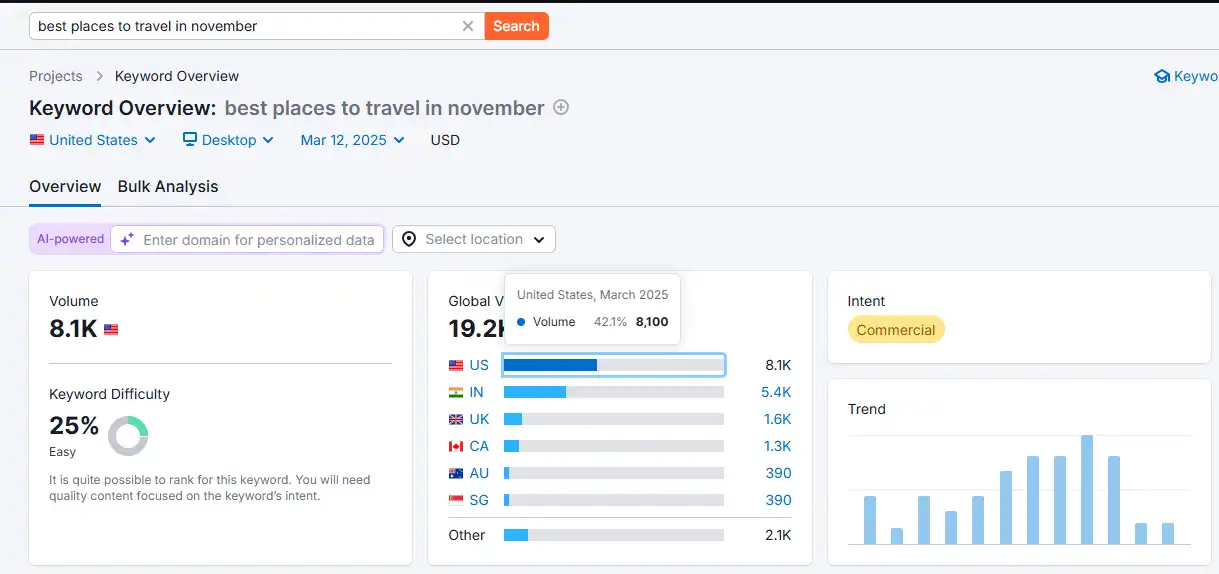When it comes to SEO, using the right keywords on your website or page is like giving Google a map to your content. But here’s the thing: you don’t need to stuff your article with every term you can think of. Instead, focus on what your target audience is searching for.
Did you know that 70% of all searches are long-tail queries? That means people are looking for specific information, and if your website answers their search engine questions, it’s more likely to land on the SERPs (aka search engine results pages) and reach the right people.
How Many Keywords Should I Use for SEO?
For SEO, in a 1200-word article, use your primary keyword about 3 to 4 times and sprinkle related or supporting keywords many times. use your main primary keyword in the title and h2 heading. This keeps your page natural while helping it rank on Google and reach your audience’s goals with the right search terms.
Is Keyword Density Really Relevant in 2025?
In 2025, keyword density isn’t as important for pages or your website as using variations and similar terms naturally. For example, when I write content, instead of stuffing the primary keyword, I use relevant terms. If the primary keyword is “best travel places in USA,” I include phrases like “top destinations in America,” “budget-friendly travel spots in the USA,” or “must-visit places in the United States.”
Abilities like Key search or a keyword research tool help me find thousands of keyword options and recommendations for secondary keywords that match the search intent and help my content rank better.
Why One Primary Keyword Is Enough

Reason 1. Any page needs one clearly defined topic
Every page online should have a specific focus to give the best user experience. If you try targeting multiple topics on a single page, it confuses both Google and your readers. A specific topic helps Google understand your content and makes it more useful for people searching.
For example, a page about “best travel tips” shouldn’t also cover “budget recipes” because they’re different topics. Keeping one relevant keyword ensures your page can rank better instead of trying to do too many things simultaneously.
Reason 2: You Can Rank for Hundreds of Keywords
With smart SEO, you can rank for hundreds of keywords by focusing on one primary keyword and adding related terms naturally. For example, if your page targets “best travel tips,” you might also rank for “budget travel advice” or “top travel hacks.” Google understands the context, so you don’t need to stuff your content. Just write for your audience, and you’ll cover multiple search terms without even trying.
Targeting Keywords for SEO – Dos and Don’ts
| Dos | Don’ts |
|---|---|
| Research keywords using reliable abilities. | Don’t stuff keywords unnaturally in content. |
| Focus on one primary keyword per page. | Don’t target multiple unrelated keywords. |
| Use long-tail keywords to match search intent. | Don’t ignore user intent or audience needs. |
| Place keywords naturally in titles, headings, and content. | Don’t overuse keywords in a way that disrupts readability. |
| Optimize meta descriptions with primary keywords. | Don’t neglect meta tags or leave them blank. |
| Include secondary keywords to support the primary one. | Don’t rely solely on one keyword for ranking. |
| Monitor keyword performance and adjust strategy. | Don’t use outdated or irrelevant keywords. |
| Write for humans first, then optimize for search engines. | Don’t prioritize search engines over user experience. |
If you’re a small business owner or you have a website and need help improving your rankings and SEO, I’m here to help, Let me optimize your content, target the right keywords, and drive organic traffic to your site. Contact me today to take your online presence to the next level
Final Thoughts
In 2025, effective SEO is about quality over quantity when it comes to keywords. Focus on one primary keyword per page, supported by related terms, to create natural, user-focused content. By prioritizing relevance and search intent, you can rank for multiple keywords and improve your overall SEO performance.
FAQs
How many SEO keywords should I use per page?
You should focus on using one primary keyword per page, along with several secondary or related keywords. This ensures your content remains focused and optimized without keyword stuffing, which can harm your rankings. Typically, use your primary keyword naturally 3–4 times in a 1200-word article.
What is the best page size for SEO?
The ideal page size for SEO is between 1–1.5MB. Smaller page sizes ensure quicker loading times, which improve user experience, reduce bounce rates, and boost search engine rankings. A fast-loading website is crucial for retaining visitors and meeting Google’s Core Web Vitals standards.
What is the optimal length for SEO?
The optimal length for an SEO-friendly post is between 2,250 and 2,500 words. Longer content tends to perform better because it is more likely to be shared, backlinked, and provide in-depth value to readers. This can positively impact ranking factors and drive more organic traffic.
What is the 80/20 rule for SEO?
The 80/20 rule, or Pareto Principle, in SEO suggests that 20% of your efforts drive 80% of your results. This means focusing on high-impact strategies, such as targeting the right keywords, creating quality content, and building backlinks, can help emerging brands scale their organic traffic and revenue efficiently.

